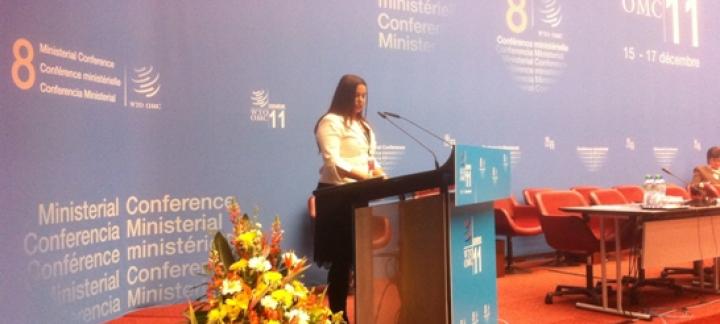17 December 2011, Geneva;Ambassador of Maldives to WTO, H. E. Ms. Iruthisham Adam today addressed the Plenary Session of WTO Ministerial Conference, Geneva, 15-17 December 2011.
In her speech Ambassador Adam noted that this is the first WTO Ministerial conference the Maldives is participating as a non-LDC and called on the membership for support to her Governments efforts in integrating into the global economy.Highlighting the unique challenges the Maldives faces as a small and vulnerable economy despite graduation, Ambassador Adam appealed to the WTO members to show the necessary flexibilities for the Maldives in the multilateral trading system. She also emphasized the instrumental role of Aid For Trade initiative in building the export capacity of the Maldives.
Commenting on the Doha negotiations, Ambassador Adam called upon the Organization to preserve the flexibilities in fisheries subsidies, domestic regulation and the issues of food security that are of paramount importance to Maldives economy. Ambassador Adam also endorsed the recent Ministerial declaration of the Trade Ministers from the Small and Vulnerable Economies and the SAARC Ministerial Communiqué that was agreed earlier in the week.
The 8th Ministerial of the WTO is being held at time of global economic downturn which is not conducive for the conclusion of the Doha trade talks. However, Ministers commended the role of the WTO in anti-protective measures in the past few years and efforts in preventing the present economic crisis descending into the level of the 1930's global depression.
The main focus of the conference was to liberalize global trade in a pragmatic manner while taking onboard the concerns of different countries such as LDCs and the Small and Vulnerable Economies (SVE).
Among some achievements of the conference are the accessions of Russian Federation, Samoa, Montenegro and Vanuatu after long and intense negotiations. Also Ministers adopted a number of decisions on intellectual property, electronic commerce, small economies, and accession of the least developed countries and a services waiver for LDCs.
END


